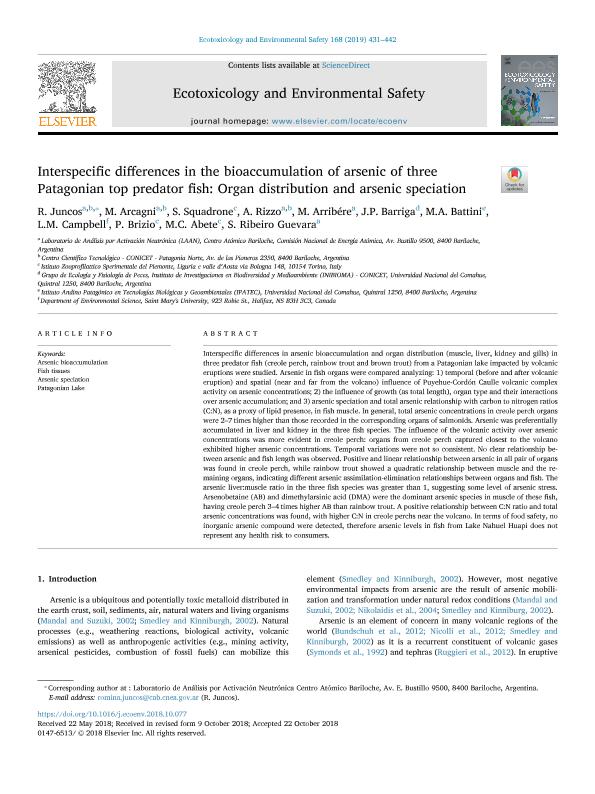Mostrar el registro sencillo del ítem
dc.contributor.author
Juncos, Romina

dc.contributor.author
Arcagni, Marina

dc.contributor.author
Squadrone, S.
dc.contributor.author
Rizzo, Andrea Paula

dc.contributor.author
Arribere, Maria Angelica

dc.contributor.author
Barriga, Juan Pablo

dc.contributor.author
Battini, Miguel Ángel

dc.contributor.author
Campbell, L.M.
dc.contributor.author
Brizio, P.
dc.contributor.author
Abete, M.C.
dc.contributor.author
Ribeiro Guevara, S.
dc.date.available
2020-08-28T14:36:34Z
dc.date.issued
2019-01
dc.identifier.citation
Juncos, Romina; Arcagni, Marina; Squadrone, S.; Rizzo, Andrea Paula; Arribere, Maria Angelica; et al.; Interspecific differences in the bioaccumulation of arsenic of three Patagonian top predator fish: Organ distribution and arsenic speciation; Academic Press Inc Elsevier Science; Ecotoxicology and Environmental Safety; 168; 1-2019; 431-442
dc.identifier.issn
0147-6513
dc.identifier.uri
http://hdl.handle.net/11336/112621
dc.description.abstract
Interspecific differences in arsenic bioaccumulation and organ distribution (muscle, liver, kidney and gills) in three predator fish (creole perch, rainbow trout and brown trout) from a Patagonian lake impacted by volcanic eruptions were studied. Arsenic in fish organs were compared analyzing: 1) temporal (before and after volcanic eruption) and spatial (near and far from the volcano) influence of Puyehue-Cordón Caulle volcanic complex activity on arsenic concentrations; 2) the influence of growth (as total length), organ type and their interactions over arsenic accumulation; and 3) arsenic speciation and total arsenic relationship with carbon to nitrogen ratios (C:N), as a proxy of lipid presence, in fish muscle. In general, total arsenic concentrations in creole perch organs were 2–7 times higher than those recorded in the corresponding organs of salmonids. Arsenic was preferentially accumulated in liver and kidney in the three fish species. The influence of the volcanic activity over arsenic concentrations was more evident in creole perch: organs from creole perch captured closest to the volcano exhibited higher arsenic concentrations. Temporal variations were not so consistent. No clear relationship between arsenic and fish length was observed. Positive and linear relationship between arsenic in all pair of organs was found in creole perch, while rainbow trout showed a quadratic relationship between muscle and the remaining organs, indicating different arsenic assimilation-elimination relationships between organs and fish. The arsenic liver:muscle ratio in the three fish species was greater than 1, suggesting some level of arsenic stress. Arsenobetaine (AB) and dimethylarsinic acid (DMA) were the dominant arsenic species in muscle of these fish, having creole perch 3–4 times higher AB than rainbow trout. A positive relationship between C:N ratio and total arsenic concentrations was found, with higher C:N in creole perchs near the volcano. In terms of food safety, no inorganic arsenic compound were detected, therefore arsenic levels in fish from Lake Nahuel Huapi does not represent any health risk to consumers.
dc.format
application/pdf
dc.language.iso
eng
dc.publisher
Academic Press Inc Elsevier Science

dc.rights
info:eu-repo/semantics/openAccess
dc.rights.uri
https://creativecommons.org/licenses/by-nc-nd/2.5/ar/
dc.subject
ARSENIC BIOACCUMULATION
dc.subject
ARSENIC SPECIATION
dc.subject
FISH TISSUES
dc.subject
PATAGONIAN LAKE
dc.subject.classification
Otras Ciencias de la Tierra y relacionadas con el Medio Ambiente

dc.subject.classification
Ciencias de la Tierra y relacionadas con el Medio Ambiente

dc.subject.classification
CIENCIAS NATURALES Y EXACTAS

dc.title
Interspecific differences in the bioaccumulation of arsenic of three Patagonian top predator fish: Organ distribution and arsenic speciation
dc.type
info:eu-repo/semantics/article
dc.type
info:ar-repo/semantics/artículo
dc.type
info:eu-repo/semantics/publishedVersion
dc.date.updated
2020-07-21T21:02:33Z
dc.journal.volume
168
dc.journal.pagination
431-442
dc.journal.pais
Estados Unidos

dc.description.fil
Fil: Juncos, Romina. Comisión Nacional de Energía Atómica. Centro Atómico Bariloche; Argentina. Consejo Nacional de Investigaciones Científicas y Técnicas. Centro Científico Tecnológico Conicet - Patagonia Norte; Argentina
dc.description.fil
Fil: Arcagni, Marina. Comisión Nacional de Energía Atómica. Centro Atómico Bariloche; Argentina. Consejo Nacional de Investigaciones Científicas y Técnicas. Centro Científico Tecnológico Conicet - Patagonia Norte; Argentina
dc.description.fil
Fil: Squadrone, S.. Istituto Zooprofilattico Sperimentale del Piemonte; Italia
dc.description.fil
Fil: Rizzo, Andrea Paula. Comisión Nacional de Energía Atómica. Centro Atómico Bariloche; Argentina. Consejo Nacional de Investigaciones Científicas y Técnicas. Centro Científico Tecnológico Conicet - Patagonia Norte; Argentina
dc.description.fil
Fil: Arribere, Maria Angelica. Comisión Nacional de Energía Atómica. Centro Atómico Bariloche; Argentina
dc.description.fil
Fil: Barriga, Juan Pablo. Consejo Nacional de Investigaciones Científicas y Técnicas. Centro Científico Tecnológico Conicet - Patagonia Norte. Instituto de Investigaciones en Biodiversidad y Medioambiente. Universidad Nacional del Comahue. Centro Regional Universidad Bariloche. Instituto de Investigaciones en Biodiversidad y Medioambiente; Argentina
dc.description.fil
Fil: Battini, Miguel Ángel. Consejo Nacional de Investigaciones Científicas y Técnicas. Centro Científico Tecnológico Conicet - Patagonia Norte. Instituto Andino Patagónico de Tecnologías Biológicas y Geoambientales. Universidad Nacional del Comahue. Instituto Andino Patagónico de Tecnologías Biológicas y Geoambientales; Argentina
dc.description.fil
Fil: Campbell, L.M.. Saint Mary's University; Canadá
dc.description.fil
Fil: Brizio, P.. Istituto Zooprofilattico Sperimentale del Piemonte; Italia
dc.description.fil
Fil: Abete, M.C.. Istituto Zooprofilattico Sperimentale del Piemonte; Italia
dc.description.fil
Fil: Ribeiro Guevara, S.. Comisión Nacional de Energía Atómica. Centro Atómico Bariloche; Argentina
dc.journal.title
Ecotoxicology and Environmental Safety

dc.relation.alternativeid
info:eu-repo/semantics/altIdentifier/url/https://linkinghub.elsevier.com/retrieve/pii/S0147651318310881
dc.relation.alternativeid
info:eu-repo/semantics/altIdentifier/doi/http://dx.doi.org/10.1016/j.ecoenv.2018.10.077
Archivos asociados
